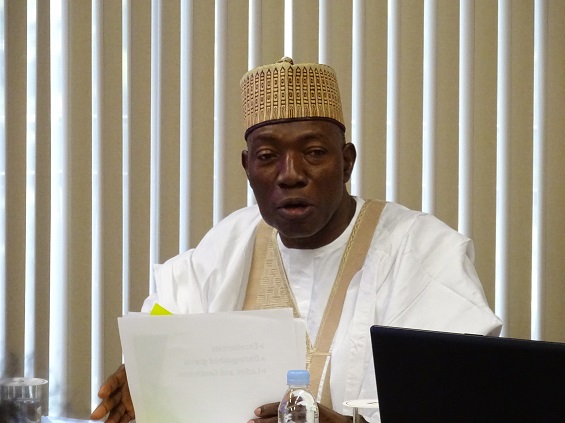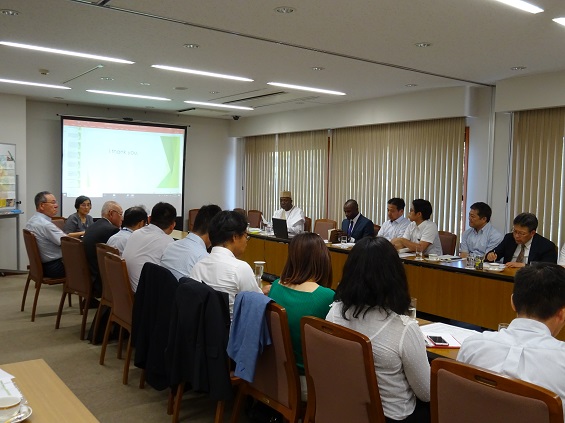
第4回在京大使との懇談会開催

- イサ駐日ナイジェリア大使との懇談会
-
Country-study Meeting with H.E.Prof.Mohammed Gana Yisa
Ambassador of the Federal Republic of Nigeria to JapanThe Society held its fourth Country-study meeting on 22nd August at the International House in Tokyo, with the presence of H.E. Prof. Mohammed Gana Yisa, Ambassador of the Federal Republic of Nigeria to Japan. (Number of attendants; 34 persons.)
The Ambassador explained that Nigeria has the biggest population and economy in Africa, and its economy is the strongest in the continent. It enjoys direct freight access to North and South America, Europe and Asia.
At independence, its economy was dependent on mainly agriculture such as cocoa and rubber, but later with the oil-boom in the 1970’s, its crude oil became the important engine of its economy. Against the background of declining prices of the crude oil in recent years, the Government took deliberate steps to change the situation not to rely on oil resources only, and decided the new blue print known as the Economic Recovery and Growth Plan (ERGP: 2017-2020) and has been trying to realize the plan. For the plan to be fully operational, development of such sectors as energy, transport, agriculture and health is deemed essential under a PPP (Public Private Partnership).
To promote such sectors , investment promotion will play a vital role and the
ECOWAS trade liberalization Scheme (ETLS) will also have roles to play. He also mentioned the Nigeria-Japan trade relations and mentioned the importance of such area as the development of 8 important mineral resources. The Ambassador also said that his government has been trying to simplify
business registration procedures so that it will become easier for businessmen to start business in Nigeria. Lastly he mentioned that the militant Boko Haram forces are not so influential and many regions in the country are free from its operations, and that under such environment, 40 Japanese companies have been operational in Nigeria safely.From the members of the Society, such questions were raised; (1) What are the policies of the Government on the use of insecticides against Malaria and other communicable diseases? (The Ambassador explained that there are certainly infection of the Malaria disease, but the Government has been increasing the number of treatment centres and the diseases-control staff for educating local people. For the prevention of diseases such as Ebola Fever, control at the air and sea ports has been strengthened.)
(2) Japan has been assisting Africa’s efforts to increase production of rice through CARD (Community of Africa’s Rice Development), and what are the plans the government has on the ways to reduce the amount of post harvest loss and other shortcomings in relation to rice cropping? (The ambassador replied that due to several reasons, such loss are made, but the Government has been trying to develop rice production by giving low-interest loan facilities for the farmers, or to help develop seeds, fertilizers, agricultural machinery, transport, technical education courses , etc)
(3) It is deemed important to develop alternative sources of energy supply in Africa. There is a Japanese company making efforts to introduce solar energy in the rural parts of Nigeria. (The Ambassador said he knows such cases and mentioned that for small-size communities, there would be much room left for developing solar and other means of alternative energy resources.)
(4)What do you think of the Naira/US dollar rates after the coming general election of Nigeria next year? Will it change? (The Ambassador said that the recent rates between the two currencies were rather stable, and therefore there are no reasons to believe there will be big changes after the election next year.)
(5) On the present congestion in and around the Lagos Port Area, has the Government any plans to resolve the issue? (The Ambassador said his Government has plans to solve the issue.)イサ駐日ナイジェリア大使との懇談会
8月22日午後、国際文化会館において、モハンメド・ガーナ・イサ駐日ナイジェリア大使に同国事情を伺う会を開催しました(会員企業等から出席者32名)。先ずイサ大使より同国がアフリカ最大の経済と人口を有しており、また地理的にはギニア湾に面し、米大陸、欧州方面への空と海の便もよいこと、経済面では独立当初はココア、ゴムなど農業中心の経済であったが、その後1970年代に石油資源が開発されるとともに、原油生産が同国経済を牽引したこと、また近年の原油価格の下落と不安定な状況を踏まえ、政府は石油依存からの脱却を図り、他の産業をバランスよく発達させるため、ERGP(経済回復及び成長計画:2017-2020)を策定し、現在その実施に努めていること、そのためにはエネルギー、運輸、農業、厚生面での開発が重要であり、プライベート・セクターと公的セクターの密接な協力(PPP)を図る必要があること、このために投資が必要であるが、ECOWASの通商自由化計画とも関係があること、現在の日本との貿易関係と、今後投資が見込まれる分野、特に8つの鉱物資源の開発などについても説明がありました。更に、同国でのビジネスを始めることがより容易になるための種々の計画を政府が有し、実施に移していること及び、近年ボコ・ハラムの影響があたかもナイジェリア全土に及ぶかのような誤解があるが、ごく少数の州であり、ナイジェリア国内で活動する40の日本の会社は通常に活動を続けていることについても説明しました。
会員企業等からは、マラリア対策の薬品使用についての政府の考えと他の疾病予防と治療の対策(大使から、長い雨季があることなどからマラリアが存在するが、コントロールセンターの設置、地域住民への教育等を行っており、また近年のエボラ熱の蔓延に際しては、衛生スタッフの増員、入国時の対策強化などの手も打っていることの説明がありました)、日本はアフリカにおけるコメ増産計画(CARD:アフリカの稲作振興のための共同体イニシアティブ)などに協力してきたが、農産物の収穫後のロスを少なくすることを含め、ナイジェリアのコメ増産に対する考えを知りたい(大使より、いくつかの理由から収穫後のロスが生じているが、政府は米増産のための、農民への低利のローンの供与など、種々の対策を講じており、その他種子、肥料、農業機械、加工、輸送などの点でも技術指導などの支援を行っているとの説明がありました)小口電力供給の為の開発を進めることは重要と思うが、日本の会社で太陽光発電に関心を有し、既にナイジェリアで活動を始めている企業がある(大使より、小規模の共同体では特に太陽光発電などが有効であると思う旨のコメントがありました)、来年の総選挙がナイラ(同国の通貨)の対ドル交換レートに影響をもたらす可能性があると考えられるか否か(大使より、最近ナイラの対ドルレートは安定しており、来年の総選挙によっても大きく変動することがあるとは思われないとの説明がありました)、現在のラゴス港の混雑緩和への解決策はあるのか(大使より、いくつかの案がある旨の返答がありました)などの質問が出されました。
(担当委員:鈴木優梨子)

主催イベント
- 第5回大使を囲む会懇親会開催
- 第6回大使を囲む会懇親会開催
- 「アフリカの文化と芸術を知る」シリーズ 第6回講演会
- 「アフリカの文化と芸術を知る」シリーズ 第5回講演会
- アフリカ協会主催 2025年第2回シンポジウム
- 2025年10月10日 第11回オンライン・アフリカ講座を開催しました。
- 2025年7月31日「アフリカの感染症を知る」シリーズ 第15回講演会を開催しました。
- 「アフリカの文化と芸術を知る」シリーズ 第4回講演会
- 学術研究会 第13回研究発表会
- 学術研究会 第12回研究発表会
- 第4回大使を囲む会懇親会開催
- 第3回大使を囲む会懇親会開催
- 第2回大使を囲む会懇親会開催
- 第1回大使を囲む会懇親会開催
- 2025年4月17日「アフリカの感染症を知る」シリーズ 第14回講演会を開催しました。
- 「アフリカの文化と芸術を知る」シリーズ 第3回講演会
- 学術研究会 第11回研究発表会
- 2025年2月7日JICA安井民間連携事業部長との懇談会を開催しました。
- 2025年1月30日「アフリカの感染症を知る」シリーズ 第13回講演会を開催しました。
- 2024年12月17日
- 第10回大使を囲む懇談会
- 2024年11月14日
- 第9回大使を囲む懇談会開催
- 2024年5月1日 第9回オンライン・アフリカ講座を開催しました。
- 学術研究会 第10回研究発表会
- 2024年10月17日「アフリカの感染症を知る」シリーズ 第12回講演会を開催しました。
- JOGMECとの懇談会開催
- 第8回大使を囲む会懇親会開催
- 第7回大使を囲む会懇親会開催
- 学術研究会 第9回研究発表会
- 第5回大使を囲む懇談会開催
- 第4回大使を囲む懇談会開催
- 第6回大使を囲む懇談会開催
- 2024年7月4日「アフリカの感染症を知る」シリーズ 第11回講演会を開催しました。
- 第3回大使を囲む懇談会開催
- 第2回大使を囲む懇談会を開催
- 学術研究会 第8回研究発表会
- 2024年5月1日 第8回オンライン・アフリカを開催しました。
- 「アフリカの文化と芸術を知る」シリーズ 第1回講演会
- 2024年4月18日「アフリカの感染症を知る」シリーズ第10回講演会を開催しました。
- 第1回大使を囲む懇談会を開催
- 第11回大使を囲む懇談会を開催
- 第8回世界一愉しいアフリカ講座を開催
- 第10回大使を囲む懇談会を開催
- 2023年1月25日「アフリカの感染症を知る」シリーズ 第9回講演会を開催しました。
- 第12回在京大使との懇談会を開催しました。
- 2023年7月6日「アフリカの感染症を知る」シリーズ第8回講演会を開催しました。
- 2023年10月26日 オンライン・アフリカ講座第7回を開催しました。
- 第9回大使を囲む懇談会を開催
- 第8回大使を囲む懇談会を開催
- 2023年8月3日学術研究会 第7回研究発表会を開催しました。
- 第6回大使を囲む懇談会開催
- 第7回大使を囲む懇談会開催
- 2023年7月13日 オンライン・アフリカ講座第6回を開催しました。
- 2023年7月6日「アフリカの感染症を知る」シリーズ第7回講演会を開催しました。
- 2023年6月23日第5回大使を囲む懇談会を開催しました。
- 2023年5月25日第4回大使を囲む懇談会を開催しました。
- 2023年5月19日第3回大使を囲む懇談会を開催しました。
- 2023年4月26日第2回大使を囲む懇談会を開催しました。
- 2023年4月11日第1回大使を囲む懇談会を開催しました。
- 2023年5月10日学術研究会 第6回研究発表会を開催しました。
- 2023年4月20日「アフリカの感染症を知る」シリーズ第6回講演会を開催しました。
- 2023年3月14日野口英世アフリカ賞受賞者講演会を開催しました。
- 2023年3月24日第14回大使を囲む懇談会を開催しました。
- 2023年3月9日第13回大使を囲む懇談会を開催しました。
- 2023年3月2日第12回大使を囲む懇談会を開催しました。
- 2023年3月29日 オンライン・アフリカ講座第5回を開催しました。
- チャレンジ企画第8弾!「オンライン対談シリーズ “Proudly from Africa 〜 アフリカのロールモデルの話を聞く” 」
- 2023年2月24日学術研究会 第5回研究発表会を開催しました。
- 2023年1月19日「アフリカの感染症を知る」シリーズ第5回講演会を開催しました。
- 第11回在京大使との懇談会を開催しました。
- モーリタニア・イスラム共和国投資促進セミナーを開催しました。
- チャレンジ企画第7弾!「オンライン対談シリーズ “Proudly from Africa 〜 アフリカのロールモデルの話を聞く” 」
- 2022年11月10日学術研究会 第4回研究発表会を開催しました。
- 2022年10月28日 オンライン・アフリカ講座第4回を開催しました。
- 2022年10月14日「アフリカの感染症を知る」シリーズ第4回講演会を開催しました。
- 2022年9月13日第11回大使を囲む懇談会を開催しました。
- 2022年8月9日第10回大使を囲む懇談会を開催しました。
- 2022年8月5日第9回大使を囲む懇談会を開催しました。
- 2022年7月26日第8回大使を囲む懇談会を開催しました。
- 2022年7月21日第7回大使を囲む懇談会を開催しました。
- 2022年7月8日第6回大使を囲む懇談会を開催しました。
- 2022年8月2日学術研究会 第3回研究発表会を開催しました。
- 2022年7月14日「アフリカの感染症を知る」シリーズ第3回講演会を開催しました。
- 2022年7月15日 オンライン・アフリカ講座第3回を開催しました。
- 2022年6月17日第5回大使を囲む懇談会を開催しました。
- 第10回在京大使との懇談会を開催しました。
- 2022年6月14日第4回大使を囲む懇談会を開催しました。
- 2022年6月2日第3回大使を囲む懇談会を開催しました。
- チャレンジ企画第6弾!「オンライン対談シリーズ “Proudly from Africa 〜 アフリカのロールモデルの話を聞く” 」
- 2022年4月28日学術研究会 第2回研究発表会を開催しました。
- 2022年4月19日「アフリカの感染症を知る」シリーズ第2回講演会を開催しました。
- 2022年3月25日 オンライン・アフリカ講座第2回を開催しました。
- 2022年5月31日第2回大使を囲む懇談会を開催しました。
- 2022年4月15日第1回大使を囲む懇談会を開催しました。
- 2022年2月15日第16回大使を囲む懇談会を開催しました。
- 2022年1月27日「アフリカの感染症を知る」シリーズ第1回講演会を開催しました。
- 2022年2月4日第15回大使を囲む懇談会を開催しました。
- 2022年1月25日第14回大使を囲む懇談会を開催しました。
- 2021年11月26日 オンライン・アフリカ講座第1回を開催しました。
- 2021年11月9日第13回大使を囲む懇談会を開催しました。
- 2021年11月5日第12回大使を囲む懇談会を開催しました。
- 2021年10月26日2021年度学術研究会 第1回研究発表会を開催しました。
- 2021年10月6日第11回大使を囲む懇談会を開催しました。
- 2021年8月27日第10回大使を囲む懇談会を開催しました。
- 2021年8月17日第9回大使を囲む懇談会を開催しました。
- 2021年8月26日
- チャレンジ企画第三弾!「オンライン対談シリーズ 分断を乗り越えて〜My Blood Divides and Unites〜」
- 2021年7月7日第8回大使を囲む懇談会を開催しました。
- 2021年7月2日第7回大使を囲む懇談会を開催しました。
- 2021年6月30日第6回大使を囲む懇談会を開催しました。
- 2021年6月2日第5回大使を囲む懇談会を開催しました。
- 2021年5月27日
- 2021年5月27日第4回大使を囲む懇談会を開催しました。
- 2021年6月24日
- チャレンジ企画第二弾! 「オンライン対談シリーズ “Proudly from Africa 〜 アフリカのロールモデルの話を聞く” 」
- 2021年4月28日
- 2021年4月28日第3回大使を囲む懇談会を開催しました。
- 2021年5月6日
- チャレンジ企画 「オンライン対談シリーズ “Proudly from Africa 〜 アフリカのロールモデルの話を聞く” 」
- 2021年4月21日
- 2021年4月21日第2回大使を囲む懇談会を開催しました。
- 2021年4月14日
- 2021年4月14日第1回大使を囲む懇談会を開催しました。
- 2021年3月16日
- 2021年3月16日「アフリカ協会創立60周年記念シンポジウム」を開催しました。
- 2020年12月22日
- 2020年12月22日第2回大使を囲む懇談会を開催しました。
- 2020年12月7日
- 第9回在京大使との懇談会を開催しました。
- 2020年10月16日第1回大使を囲む懇談会を開催しました。
- 2020年3月3日第13回大使を囲む懇談会を開催しました。
- 第8回在京大使との懇談会を開催しました。
- 2020年1月15日
- 2020年1月15日第12回大使を囲む懇談会を開催しました。
- 第11回フォーラム「TICAD 7 の成果とこれからの官民連携について」
- 2019年12月24日
- 2019年12月24日第11回大使を囲む懇談会を開催しました。
- 2019年10月16日
- 2019年10月16日第10回大使を囲む懇談会を開催しました。
- 2019年10月2日第9回大使を囲む懇談会を開催しました。
- 2019年9月19日
- 第7回在京大使との懇談会を開催しました。
- 2019年6月24日
- 第10回フォーラム「TICAD 7 官民連携のあり方と進化について」
- 第6回在京大使との懇談会を開催しました。
- 2019年9月29日
- 「第7回世界一愉しいアフリカ講座」
- 2019年7月17日第8回大使を囲む懇談会を開催しました。
- 2019年7月3日
- 2019年7月3日第7回大使を囲む懇談会を開催しました。
- 2019.7.1
- 2019年7月1日第6回大使を囲む懇談会を開催しました。
- 2019.615
- 2019年6月15日第7回『アフリカから学ぶー文化編』を開催しました。
- 2019.5.31
- 2019年5月31日第5回大使を囲む懇談会を開催しました。
- 2019年5月7日
- 2019年5月7日第4回大使を囲む懇談会を開催しました。
- 2019年4月23日
- 2019年4月23日第3回大使を囲む懇談会を開催しました。
- 2019年4月17日
- 2019年4月17日第2回大使を囲む懇談会を開催しました。
- 2019年4月1日
- 2019年4月1日第1回大使を囲む懇談会を開催しました。
- 2019年3月12日第14回大使を囲む懇談会を開催しました。
- 2019年2月21日第13回大使を囲む懇談会を開催しました。
- 2019年2月13日第12回大使を囲む懇談会を開催しました。
- 2019年2月5日第11回大使を囲む懇談会を開催しました。
- 2019年1月25日第10回大使を囲む懇談会を開催しました。
- 2019年1月16日
- 2019年1月16日第9回大使を囲む懇談会を開催しました。
- 2019年1月10日
- 2018年1月10日第8回大使を囲む懇談会を開催しました。
- 2018年12月8日第6回『アフリカから学ぶー映画編』を開催しました。
- 第5回在京大使との懇談会を開催しました。
- 2018年10月23日
- 2018年10月23日 合田真 日本植物燃料株式会社 代表取締役 講演会を開催しました。
- 2018年9月29日
- 第5回世界一愉しいアフリカ講座を開催しました。
- 2018年8月6日
- 第9回フォーラム「アフリカにおける金融と産業振興」議事録(抄録)
- 2018年8月22日
- 第4回在京大使との懇談会を開催しました。
- 第9回フォーラム
- 2018年7月25日
- 2018年7月25日第7回大使を囲む懇談会を開催しました。
- 2018年7月14日
- 2018年7月14日第5回『アフリカから学ぶー映画編』を開催しました。
- 2018年6月22日
- 2018年6月22日第6回大使を囲む懇談会を開催しました。
- 2018年6月1日
- 2018年6月1日第5回大使を囲む懇談会を開催しました。
- 2018年5月23日
- 2018年5月23日第4回大使を囲む懇談会を開催しました。
- 第8回フォーラム「アフリカにおける中国の動向と日本」
- 2018年5月10日
- 2018年5月10日第3回大使を囲む懇談会を開催しました。
- 2018年4月24日
- 2018年4月24日第2回大使を囲む懇談会を開催しました。
- 2018年4月9日
- 2018年4月9日第1回大使を囲む懇談会を開催しました。
- 2018年3月29日
- 平成29年度大使レセプション報告
- 2018年3月23日
- 2018年3月23日池亀美枝子AU-NEPADアフリカ連合開発機構総裁特別顧問講演会を開催しました。
- 2018年2月2日
- 2018年2月2日第14回大使を囲む懇談会を開催しました。
- 2018年1月26日
- 2018年1月26日第13回大使を囲む懇談会を開催しました。
- 2017年12月9日
- 2017年12月9日第4回『アフリカから学ぶー社会・文化編』を開催しました。
- 2017年11月24日
- 2017年11月24日第12回大使を囲む懇談会を開催しました。
- 2017年11月1日
- 2017年11月1日第11回大使を囲む懇談会を開催しました。
- 2017年10月25日
- 2017年10月25日第10回大使を囲む懇談会を開催しました。
- 2017年10月13日
- 第3回在京大使との懇談会を開催しました。
- 2017年6月5日
- 第7回フォーラム「地域シリーズ第3回・南部アフリカー域内流通と産業振興ー」
- 2017年8月1日
- 2017年第1回牧野前JICAガーナ所長を囲む懇談会開催
- 2017年7月20日
- 2017年7月20日第9回大使を囲む懇談会を開催しました。
- 2017年5月16日
- 2017年5月16日 第2回在京大使との懇談会を開催しました。
- 2017年6月28日
- 2017年6月28日第8回大使を囲む懇談会を開催しました。
- 2017年6月15日
- 2017年6月15日第7回大使を囲む懇談会を開催しました。
- 2017年6月13日
- 2017年6月13日第6回大使を囲む懇談会を開催しました。
- 2017年5月31日
- 2017年5月31日第5回大使を囲む懇談会を開催しました。
- 2017年5月25日
- 2017年5月25日第4回大使を囲む懇談会を開催しました。
- 2017年5月19日
- 2017年5月19日第3回大使を囲む懇談会を開催しました。
- 2017年4月25日第2回大使を囲む懇談会を開催しました。
- 2017年4月12日
- 2017年4月12日第1回大使を囲む懇談会を開催しました。
- 2017年3月14日
- 2017年3月14日第17回大使を囲む懇談会を開催しました。
- 2017年3月9日
- 2017年3月9日第16回大使を囲む懇談会を開催しました。
- 2017年2月15日
- 2017年2月15日 第15回大使を囲む懇談会を開催しました。
- 2017年1月18日
- 2017年1月18日 第14回大使を囲む懇談会を開催しました。
- 2017年1月17日
- 2017年1月17日 第1回在京大使との懇談会を開催しました。
- 2017年1月11日
- 2017年1月11日 第13回大使を囲む懇談会を開催しました。
- 2016年12月20日
- パソナグループ南部代表 表敬訪問
- 2016年12月12日
- 服部禮次郎アフリカ基金 2016年度助成授与式及び感謝の盾贈呈
- 2016年10月18日
- 第6回フォーラム「TICAD VI 報告―民間セクターによる事業投資と人材育成」
- 2016年11月30日
- 平成28年度大使レセプション報告
- 2016年11月8日
- 2016年11月8日第12回大使を囲む懇談会を開催しました。
- 2016年11月7日
- 2016年11月7日第11回大使を囲む懇談会を開催しました。
- 2016年10月25日
- 2016年10月25日第10回大使を囲む懇談会を開催しました。
- 2016年10月4日
- 2016年10月4日第9回大使を囲む懇談会を開催しました。
- 2016年7月20日
- 7月20日岸田外務大臣を表敬のうえTICAD Ⅵに向けた政策提言を提出
- 第5回フォーラム 「TICAD VI ビジネスと人材育成-日本らしい視点で」
- 2016年7月5日
- 2016年7月5日第8回大使を囲む懇談会を開催しました。
- 2016年6月22日
- 2016年6月22日第7回大使を囲む懇談会を開催しました。
- 2016年5月13日
- 2016年5月13日第6回大使を囲む懇談会を開催しました。
- 2016年4月27日
- 第5回大使を囲む懇談会を開催しました。
- 2016年4月21日
- 第4回大使を囲む懇談会を開催しました。
- 2016年4月18日
- 第3回大使を囲む懇談会を開催しました。
- 2016年4月12日
- 第2回大使を囲む懇談会を開催しました。
- 2016年4月5日
- 第1回大使を囲む懇談会を開催しました。
- 2016年2月1日
- 2016年2月1日第13回大使を囲む懇談会を開催しました。
- 2016年1月19日
- 2016年1月19日第12回大使を囲む懇談会を開催しました。
- 2015年12月21日
- 2015年12月21日第11回大使を囲む懇談会を開催しました。
- 2015年12月17日
- 2015年12月17日第10回大使を囲む懇談会を開催しました。
- 2015年12月10日
- 2015年12月10日第9回大使を囲む懇談会を開催しました。
- 2015年11月24日
- 第2回江口前JICAケニア所長を囲む懇談会開催
- 2015年11月20日
- 第8回大使を囲む懇談会開催
- 2015年10月22日
- 第7回大使を囲む懇談会開催
- 2015年10月19日
- 第2回山田前ジェトロ・アビジャン所長を囲む懇談会
- 2015年10月1日
- 第6回大使を囲む懇談会開催
- 2015年9月28日
- 鈴木裕之国士舘大学教授講演会 開催
- 2015年7月29日
- 平成27年大使レセプション報告
- 2015年7月9日
- 第4回フォーラム 「地域シリーズ第2回・西部アフリカ-西アフリカも面白い-」
- 2015年7月6日
- 第5回大使を囲む懇談会開催
- 2015年6月16日
- 第4回大使を囲む懇談会開催
- 2015年5月29日
- 第3回大使を囲む懇談会開催
- 2015年5月26日
- 第2回大使を囲む懇談会開催
- 2015年5月19日
- 第1回佐藤ジェトロ・ラゴス事務所長を囲む懇談会開催
- 2015年5月15日
- 第1回大西前JICAタンザニア所長を囲む懇談会開催
- 2015年4月28日
- 2015年度第1回大使を囲む懇談会開催
- 2015年3月24日
- 第14回大使を囲む懇談会開催
- 2015年2月10日
- 第13回大使を囲む懇談会開催
- 2015年1月15日
- 進藤奈邦子WHOメディカルオフィサー講演会開催
- 2014年12月17日
- 第12回大使を囲む懇談会開催
- 2014年12月2日
- 特別セミナー エボラ出血熱治療研究の最前線
- 第3回フォーラム
2014年11月25日 - 「地域シリーズ第1回・東部アフリカ―消費財を通じて豊かな生活の実現へ」
- 2014年11月13日
- 第11回大使を囲む懇談会開催
- 2014年10月30日
- 第10回大使を囲む懇談会開催
- 2014年10月17日
- 第9回大使を囲む懇談会開催
- 2014年9月22日
- 第8回大使を囲む懇談会開催
- 2014年9月1日
- 第7回大使を囲む懇談会開催
- 2014年8月4日
- 第6回大使を囲む懇談会開催
- 2014年5月27日
- 安倍昭恵総理夫人講演会開催
- 2014年6月11日
- 平成26年度 アフリカ大使レセプション報告
- 2014年5月23日
- 第4回大使を囲む懇談会開催
- 2014年5月16日
- 第5回大使を囲む懇談会開催
- 2014年4月23日
- 第3回大使を囲む懇談会開催
- 2014年4月14日
- 第2回大使を囲む懇談会開催
- 2014年3月27日
- 第1回大使を囲む懇談会開催
- 2014年2月12日
- 安倍首相のアフリカ訪問に関する報告会・討論会 議事録
- アフリカ協会・日仏会館共催シンポジウム
2013年10月18日 - 「第5回アフリカ開発会議は何を残したか?-アフリカの挑戦と日本の挑戦」
- 第2回フォーラム
2013年4月12日 - 「アフリカの民間セクターと ビジネスチャンス」
- 第1回フォーラム
2012年11月26日 - 「TICAD Vと民間連携」




